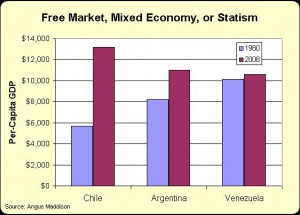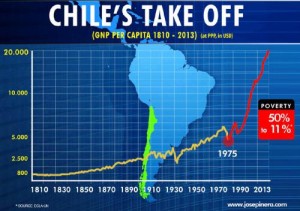here aren’t any nations with pure libertarian economic policy, but there are a handful of jurisdictions that deserve praise, either because they have comparatively low levels of statism or because they have made big strides in the right direction.
Hong Kong and Singapore are examples of the former, and Switzerland deserves honorable mention.
And if we look at nations that have moved in the right direction, then Chile is definitely a success story.
The free-market revolution in Chile is remarkable. If you look at the Economic Freedom of the World rankings, Chile was in last place in 1970 and third from the bottom in 1975. But then reforms began. It climbed to 60th place in 1980, 40th place in 1985, 28th place in 2000, and Chile now has one of the world’s freest economies, hovering around 10th place.
 And the results are amazing. Now known as the Latin Tiger, Chile has become the richest nation in the region, thanks to a big increase in economic liberty. Many people know about that nation’s very successful system of personal retirement accounts (discussed hereby Jose Pinera), but Chile’s economic renaissance is much deeper than private pensions.
And the results are amazing. Now known as the Latin Tiger, Chile has become the richest nation in the region, thanks to a big increase in economic liberty. Many people know about that nation’s very successful system of personal retirement accounts (discussed hereby Jose Pinera), but Chile’s economic renaissance is much deeper than private pensions.
The country has an admirable system of school choice, for instance, and 60 percent of students now attend private schools.
 Most remarkable, the poverty rate has plummeted, showing that free markets and small government are the best way of helping the less fortunate.
Most remarkable, the poverty rate has plummeted, showing that free markets and small government are the best way of helping the less fortunate.
But there’s no such thing as permanent success, and it appears that Chilean politicians may try to kill the geese that are laying the golden eggs.
Here are some excerpts from a Wall Street Journal report, starting with a description of the class-warfare tax plan proposed by the nation’s socialist leader.
Chile’s leftist government is proposing a controversial overhaul of its tax code that business leaders say threatens to reverse the gains that have made this country Latin America’s most prosperous nation. …The government says the tax reform will increase the tax haul by three percentage points of annual economic output, or by about $8.2 billion annually. The proposed overhaul includes an increase in the corporate tax rate to 25% from the current rate of 20% and the elimination of a popular tax exemption program that allows businesses that reinvest profits, known as the FUT. …Ms. Bachelet, a 62-year-old Socialist Party member, said Wednesday that the changes are required to fund a plan to improve the quality of the schools system.
The FUT system sounds like expensing, which is how the tax code should treat business investment, not a loophole.
In any event, we definitely know that the tax plan would significantly boost the tax burden.
And that has wealth creators worried.
The plan to raise the corporate tax rate and close an exemption that companies use to reinvest profits has stirred up an ideologically-charged debate at a time when economic growth has weakened to its slowest level in four years. …many of the company’s 450 business clients in Chile are reconsidering investment plans. “They are watching this with a lot of concern.” …business groups say they will try to pressure the government to rethink the tax overhaul. Juan Pablo Swett, the head of Chile’s association of small businesses, said that some 250,000 small-business owners could protest if the government doesn’t save the FUT. “Chile is going down the road of Latin American populism,” added Axel Kaiser, an economist and executive director at the Foundation for Progress, a conservative Chilean think tank.
The story notes that economic reform has been very positive for Chile.
This mineral-rich, long sliver of a country that hugs the Pacific Ocean has long been a laboratory for economic innovation. Starting in the mid-1970s, when much of Latin America had closed their economies from international trade, Chile went the other way, embarking on a program to liberalize trade, deregulate and even create a private pension system. Since 1990, successive governments, most of them left-leaning, oversaw business-friendly policies that turned it into the region’s most stable and wealthiest nation. …The robust economic growth, coined the “Chilean Miracle,” led to a decline in poverty to 15% in 2011 from almost 40% in 1990, according to the World Bank. During the same period, Chile’s gross domestic product per capita rose from less than $5,000 to more than $20,000, the highest in Latin America.
And since reform has produced such good results, that leaves us with two issues.
First, why do the politicians want to ruin a good thing? These people presumably are educated and well-traveled. They must realize how Chile has prospered relative to other nations in the region. So why tinker with success? Are they really so short-sighted that they’re willing to condemn their nation to slower growth just so they have the ability to buy votes with a temporary increase in tax revenue?
Second, why did voters elect these politicians? Don’t they realize that they’ve benefited from the pro-market reforms? Though I suspect the answer is that previous left-of-center governments haven’t done anything bad, while the recently ousted right-of-center government didn’t do anything good, so maybe voters didn’t realize that the new left-leaning government intended to make radical changes.
Regardless, it will be tragic if these reforms are imposed and Chile sinks back into economic stagnation.
The world in general – and Latin America in particular – already has plenty of basket case economies such as Cuba, Venezuela, and Argentina. The last thing we need is another statist economy.
I realize this may sound like whining, but it would make my job easier to have more examples of jurisdictions that can be role models for free markets and small government.
